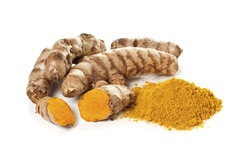Premenstrual syndrome (PMS) is defined as the cyclic physical symptoms and mood change which start sometime from mid-cycle to the end of the menses but then ends either with the onset of menses or by the end of menses. Changes in neurotransmitters and prostaglandins are the primary physiological issues of PMS. Curcumin studies demonstrate its ability to reduce prostaglandin synthesis and animal studies demonstrate an action of curcumin in modulating serotonin, dopamine and norepinephrine thus exerting an antidepressant effect. Based on these observations of curcumin and the role of prostaglandins and neurotransmitters in the etiology of PMS, a study on curcumin was conducted to evaluate the effects on the severity of premenstrual mood, behavior and physical symptoms.
mood change which start sometime from mid-cycle to the end of the menses but then ends either with the onset of menses or by the end of menses. Changes in neurotransmitters and prostaglandins are the primary physiological issues of PMS. Curcumin studies demonstrate its ability to reduce prostaglandin synthesis and animal studies demonstrate an action of curcumin in modulating serotonin, dopamine and norepinephrine thus exerting an antidepressant effect. Based on these observations of curcumin and the role of prostaglandins and neurotransmitters in the etiology of PMS, a study on curcumin was conducted to evaluate the effects on the severity of premenstrual mood, behavior and physical symptoms.
This randomized, double-blind, placebo controlled study was in healthy 21-35 years old women with regular menstrual cycles who had at least 5 symptoms of 19 on a PMS questionnaire. The women who met the criteria for a PMS diagnosis, were then randomly assigned to two groups with 35 in each. Group one received curcumin 100 mg every 12 hours from 7 days before and until 3 days after the onset of menstrual bleeding and for 3 consecutive menstrual cycles. Group two received placebo in the same regimen. Four women in the placebo group and 3 in the curcumin group did not complete the study.
Total severity of PMS score reduced from 102.6 to 42.47 with a mean change of 59.59 in the curcumin group. In the placebo group, the total severity of PMS score changed from 106.06 to 91.60 with a mean change of 14.45. The difference between the two was significant.
Commentary: PMS is one of the most common health problems in women of reproductive age. Premenstrual mental/emotional symptoms of irritability, anxiety, aggression, depression and changes in concentration and are thought to be primarily due to the central role of serotonin changes in PMS. The normal progesterone and estradiol decline in the luteal phase of the menstrual cycle result in withdrawal of the hormonal effects on serotonin, dopamine and norepinephrine.
Laboratory studies and animal studies have confirmed that curcumin is able to modulate norepinephrine, dopamine and serotonin and affect the inflammatory pathways. In addition to the neurotransmitters, the production of prostaglandin E2 is likely involved in some of the physical PMS symptoms such as pain, swelling and inflammation such as breast pain and engorgement, headaches, extremity edema and others. It is the understanding of the role of neurotransmitters and prostaglandins in PMS, and the observation of the influence of curcumin on neurotransmitters and prostaglandins that led to the theory that curcumin could be helpful in treating PMS.
Curcumin has not been on my treatment option list for PMS. We have many excellent natural therapies that have been researched with good effects in PMS including calcium, vitamin B6, St. John’s Wort, Chaste tree berry, evening primrose oil, and tryptophan. I will now be thinking of PMS cases in which I might add curcumin to my use of the other nutrients and herbs. I will likely start with cases in which there is significant premenstrual physical pains.
One of the disappointments of this study was that no information was given as to the amount of curcuminoids in the product, only that it was 100 mg of curcumin.
Reference
Khayat S, Fanaei H, Kheirkhah M, et al. Curcumin attenuates severity of premenstrual syndrome symptoms: A randomized, double-blind, placebo-controlled trial. Complementary Therapies in Medicine 2015; 23: 318-324

